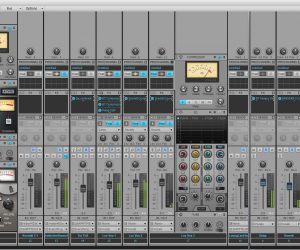
Review: Beyerdynamic DT1990 Pro
After listening to Beyerdynamic’s DT1990 Pros I’ve realised I haven’t found the point where you’re paying too much for a pair of headphones. At $1159, these feel like a bargain.
These open backed cans are seriously revealing, like peering through the looking glass with a pair of binoculars. I’ve got a variety of headphones lying around, but I knew I’d stumbled behind the veil into a secret garden of detail as soon as I put the Beyer cans on.
Like most open-back, circumaural headphones, you get a wider sense of space than with closed backs. The Beyers are no different in that regard, but it’s how things separate out across that space that seemed relevant, most of which came down to high end detail. Down at the bass end, you can actually change the response with two alternative sets of velour ear pads with different numbers of perforations around the rim — one is dubbed ‘Analytical’, the other ‘Balanced’. Basically, it’s options A and B, where B really stands for ‘more bass’. They ship with the B option installed, but A is more suited to professional use. It’s still got plenty of balls when you load up an 808, and the transient details of kicks and snares are rendered precisely. As far as bass weighting goes in this mode, when I slapped a pair of Audio-Technica ATH-M50s back on I felt like I was ‘in da club’ . The pads aren’t difficult to change, there’s a little notch in the cup that lets you rotate them around the 45mm driver housings with one full turn.
The mid range is clear and present, though not overstated, and the highs are where the money is. I’ve been playing with Eventide’s new structural effects plug-in, Fission. It allows you to split a sound into its transient and tonal details. The Beyers really excelled at zooming in to help set the precise crossover point where the transient decay sounded most natural. After processing it with a very short delay, I could still hear the delay’s effect without straining when balancing it with the tonal portion’s processing. On other cans — like the cheaper, but still open-backed Audio-Technica R70x — the detail of that delay was harder to hear.
NEED TO KNOW
Beyerdynamic DT1990 Pro
Open Back Headphones

You won’t have to listen to these cans loud to get all the details. In fact, you shouldn’t. A side effect of having such detailed and forward high end is it will force you to keep the volume low. Keeping level low is good for listening over a long period anyway, so you’ll be thanking Beyer for that. The cans are very comfortable, but like all Beyers cans, there’s a downside to incorporating high quality metal construction; weight. The first real headphones I ever had were the DT770 Pro closed backs. I eventually moved onto Audio-Technica M50s, because they were cheaper and lighter, which made them easier to have on your head during a day of tracking. While these aren’t the heaviest cans, you will feel them start to sink into your head when compared to plastic ones.
Beyer does everything to offset that weight by installing a plush headband and the velour pads. I have found that I get a bit sweaty on a hot day with these pads — something to keep in mind if you’re similarly prone.
The rest of the packaging matches Beyer’s high-quality construction. You get a moulded carry case that houses every component, including the second set of ear pads, and an optional three metre-long straight cable housed in an internal pouch if you don’t like the coiled one. Both are gold-plated detachable cables, via a 3-pin mini-XLR jack that clips into the headphone housing, and each have screw-on 6.5mm jacks.
These are amazing sounding headphones that will reveal loads of detail you may never have heard before. And, as with the DT770 Pros — which my dad still uses — these Beyer cans will be around for decades. Worth the investment.
















RESPONSES